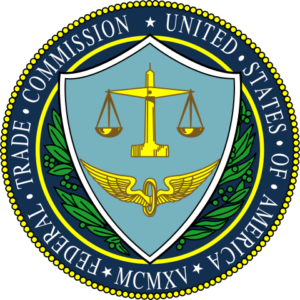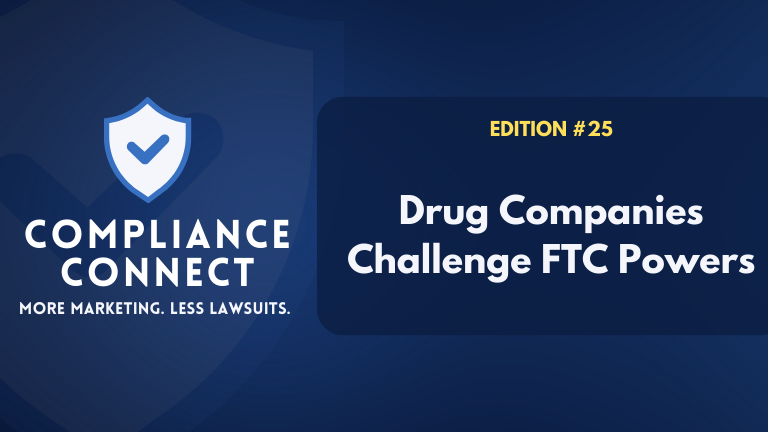Good morning, and happy Thanksgiving! This is the twenty-fifth edition of the Compliance Connect newsletter.
The goal is simple: to keep you in the loop on what the FTC and other regulatory agencies are up to so that you can protect yourself.
These newsletters will land in your inbox twice a week – Mondays and Thursdays.
Remember: this is NOT legal advice, only information!
Here’s the rundown today…
- ⚖️ FTC’s Power Challenged In Court…
- 🤖 Security Company Accused Of False AI Claims…
- 🏛️ The 2 Ways The FTC Can Go After Businesses…
- 🔎 The FTC Was Active In 2023…
- 💵 An Important Rule High Ticket Sellers Need To Know…
Compliance Digest: What You Should Read Today
Drug Companies Fire Back At The FTC – Challenging Fundamental Powers
The FTC is investigating pharmacy benefit managers (PBMs), claiming that they are inflating insulin costs. They are bringing this case in administrative court.
These companies have filed a lawsuit against the FTC, claiming their due process rights are being violated.
They assert the FTC’s stance on pricing and contracts is SUBJECTIVE and would require significant changes to their agreements.
They claim the agency’s approach to reshaping the industry through enforcement would NOT hold up in federal court.
The FTC counters that such lawsuits are attempts to deflect scrutiny from practices that harm consumers, such as high medicine costs.
The outcome could redefine how administrative actions are applied in similar cases – especially if it reaches the Supreme Court.
The Supreme Court has repeatedly weakened the power of the FTC and other regulatory agencies in recent years. They’ve even opened the door to challenging administrative proceedings.
FTC commissioners, appointed by the president, oversee the agency, and its complaint against PBMs is set for review in 2025 as new leadership of the FTC takes over.
FTC Sues Company Over False AI Claims
The FTC is suing Evolv Technologies for making false claims about its AI-powered security scanners.
These were famously installed in the New York subway system earlier this year.
Evolv allegedly misrepresented the scanners’ ability to detect weapons and ignore harmless items like laptops and water bottles.
The FTC says the scanners failed in schools, including missing a knife used in a stabbing, despite Evolv claiming superior accuracy and efficiency.
Evolv introduced COSTLY fixes that made the system similar to traditional metal detectors.
The proposed settlement would stop Evolv from making unsupported claims and let some schools cancel contracts.
This case is part of the FTC’s broader efforts to regulate deceptive AI marketing.

The 2 Ways The FTC Can Act Against A Company
When the FTC takes action against a company for violating the law, it has two main ways to do it: judicial enforcement and administrative enforcement.
While both paths aim to ensure businesses play by the rules, they work differently and serve unique purposes.
As we discussed in the Compliance Digest, the administrative enforcement capacity of the FTC is being challenged in court.
Option #1: Suing In Federal Court
The FTC uses this process when it needs to act quickly or when it’s seeking serious penalties, like financial fines or refunds to harmed consumers.
Here’s how it works…
- The FTC believes a company is breaking the law
- They can file a case directly in court.
- The court can issue an injunction to stop the harmful behavior immediately.
- The case moves forward like any other court case, with judges and legal arguments.
- Penalties can include fines, refunds, prohibitions or other remedies.
Judicial enforcement is ideal for urgent situations.
For example, if a company is using deceptive advertising to get customers, this allows the FTC to quickly put a stop to it.
Option #2: Handling It In-House
Administrative enforcement is like the FTC’s version of an internal court system.
Instead of going to federal court right away, the FTC handles the case within its own organization.
Here’s how it works…
- The FTC has reason to believe a company is violating the law.
- It issues an administrative complaint.
- The case is heard by an administrative law judge (ALJ), who reviews the evidence and makes an initial decision.
- If either side isn’t happy with the ruling, they can appeal to the full FTC Commission.
- If the company still disagrees, it can take the case to a federal court for review.
- Common penalties are cease and desist orders, although other penalties do happen.
Administrative enforcement isn’t as effective for urgent situations, since there are multiple layers of review. It’s often used for more detailed or complex cases where the FTC wants to dig deep into the facts before making a final decision.
What’s the Difference?
In simple terms, judicial enforcement is faster and more forceful, often used to stop harmful actions immediately and seek big penalties.
Administrative enforcement is slower and more detailed, focusing on long-term compliance and resolving complex issues.
Both are EXPENSIVE to go through, even if the final punishment isn’t severe.
Hopefully you’ll never need to experience what it’s like to go through either process!
Did You Know…
In 2023, the FTC filed 43 complaints in federal court on consumer protection matters. $285.4 million was returned to customers.

Quick Compliance Tip: Final Dollar Rule
In the latest episode of the Don’t Say That podcast, Greg explains an important concept called the “Final Dollar Rule.”
The FTC and other regulators don’t want businesses to knowingly take a customer’s last available resources to purchase a product or service.
This rule is all about preventing situations where a customer is left in financial ruin because they’ve exhausted all their money or credit to make the purchase.
For example, if a salesperson realizes during a sales call that a customer has limited funds and is going to do extreme things like…
- Using multiple credit cards
- Taking out high-interest loans
- Tapping into retirement funds
- Taking out a second mortgage
And they still proceed to push the sale, they may be violating the Last Dollar Rule.
The FTC considers this practice unethical because it can exploit vulnerable consumers and create significant financial hardship for them.
You don’t want to push customers into financial distress!
If the FTC investigates and finds a pattern of these practices, it’s almost impossible to defend.
You must set BOUNDARIES, such as limiting the number of credit cards you accept for a single transaction or avoiding situations where customers are clearly stretching beyond their means.
Staying ethical and transparent protects both your customers and your business!
